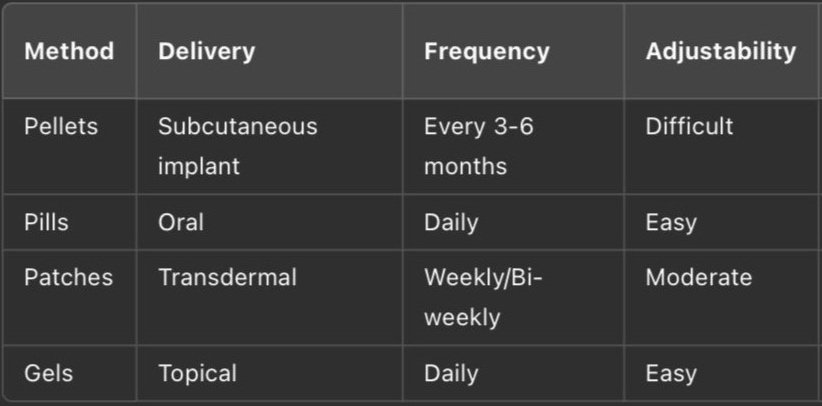
Top 10 Pros and Cons of Hormone Pellets You Need to Know
Hormone pellets have become a popular hormone replacement therapy (HRT) option. This guide thoroughly explores the pros and cons of hormone pellets, equipping you with essential information for an informed decision.
Pros of Hormone Pellets
-

Consistent Hormone Delivery
Hormone pellets steadily deliver hormones, minimizing fluctuations commonly seen with other methods, contributing to stabilized mood and energy levels.
-

Convenience
Once inserted, hormone pellets require minimal upkeep, eliminating the daily hassle associated with pills, injections, or creams.
-

Improved Symptom Relief
Patients often experience substantial relief from menopausal symptoms like hot flashes, night sweats, and mood swings through pellet therapy.
-

Enhanced Libido and Sexual Function
Hormone pellets, especially testosterone, significantly boost libido and sexual wellness for both men and women.
-

Bone Health Benefits
Estrogen delivered via pellets can help maintain or improve bone density, reducing osteoporosis risk among postmenopausal women.
-

Long Lasting Effects
Hormone pellets provide long-lasting relief, typically ranging from three to six months, reducing the frequency of treatment visits compared to other HRT methods.
Cons of Hormone Pellets
Surgical Procedure Required
Pellet insertion requires a minor surgical procedure, carrying risks such as infection, discomfort, or bruising at the implantation site.
Requires Possible Dose Adjustment
Adjusting hormone dosage after pellet insertion is challenging, requiring patience until pellets dissolve or insertion of new pellets if issues arise.
Potential Side Effects (All HRT Therapy)
Possible side effects include acne, weight gain, mood swings, or hair growth changes. Close monitoring and communication with healthcare providers are vital.
Cost Considerations (Higher Upfront / Lower Longterm)
Hormone pellet therapy often costs more than other HRT forms, and insurance coverage may vary, increasing out-of-pocket expenses.
Potential Scar Formation
Repeated insertions of hormone pellets may lead to scar tissue formation at the implantation site, potentially complicating future insertions or causing localized discomfort.
Pellets Vs Traditional HRT Therapies
Comparing Hormone Pellet Therapy to Other HRT Methods
Medical Insights on Hormone Pellets
The Cleveland Clinic highlights the importance of understanding that compounded hormone pellets have not undergone rigorous FDA evaluations.
It is essential to thoroughly discuss potential risks and benefits with healthcare providers.
Research published in the Journal of the North American Menopause Society suggests women using pellets may encounter more frequent mood swings, anxiety, and weight gain compared to traditional HRT methods.
Hormone Level Stability Comparison
To understand why hormone pellets may offer advantages over other hormone therapies, consider this graphical representation of hormone fluctuations over time:
Ratings based on data from American Journal of Medicine.
Negative Side Effects of Hormone Pellets
Potential negative effects from hormone pellets, particularly testosterone and estrogen in women, include:
Acne
Increased facial hair growth
Mood disturbances
Weight fluctuations
Irregular bleeding
Breast tenderness
Bioidentical Hormones Side Effects
Common side effects of bioidentical hormones include:
Fatigue
Headaches
Nausea
Changes in appetite
These symptoms usually diminish as the body adjusts, but ongoing communication with a healthcare professional is recommended.
Who Is the Ideal Candidate for Hormone Pellets?
Hormone pellet therapy might be particularly beneficial if you:
Struggle consistently with menopausal symptoms (hot flashes, mood swings, fatigue).
Seek a convenient hormone replacement solution without daily administration.
Prefer a method offering more consistent hormone levels than traditional HRT methods.
Haven’t found relief with other hormone therapies.
However, hormone pellets might NOT be suitable if you:
Prefer a method easily adjustable based on side effects.
Have a history of breast or uterine cancer.
Are prone to scarring or allergic reactions.
Always consult your healthcare provider for personalized guidance.
FAQs
What are hormone pellets made of?
Hormone pellets contain bioidentical hormones derived from natural plant sources and are designed to match the hormones naturally produced by the body.
How long do hormone pellets last?
Typically, hormone pellets last between 3 to 6 months, depending on individual absorption rates.
Are hormone pellets safe?
While many users safely benefit from hormone pellets, risks such as infection, incorrect dosage, or side effects should be carefully considered.
Can hormone pellets be removed?
Once inserted, hormone pellets are not easily removable, and adjustments usually require waiting for them to dissolve naturally or inserting new pellets.
Who should avoid hormone pellets?
Individuals with certain medical conditions like breast cancer, blood clotting disorders, or uncontrolled diabetes should avoid pellet therapy and consult their healthcare provider for alternatives.
Hear from individuals who've chosen hormone pellet therapy to manage hormonal imbalances:
Dr. Michael T., age 62
"As a physician and pellet user myself, I appreciate their convenience and steady hormone delivery. However, I always remind my patients to weigh the pros and cons carefully."
Janet L., age 54
“After years of battling menopausal symptoms, hormone pellets were a game changer. My mood swings are almost nonexistent, and my energy is better than ever.”
Dr. Elena Martinez, Board-Certified Endocrinologist:
"Hormone pellets provide consistent hormone delivery, which can significantly improve quality of life for patients suffering severe hormonal symptoms. However, the absence of FDA approval means there’s variability in quality across providers, emphasizing the importance of choosing a reputable provider experienced with hormone pellet therapy."
Real-Life Patient Testimonials on Hormone Pellets
Additional Resources for Informed Decision-Making
Explore these reputable medical resources to enhance your understanding:
The North American Menopause Society (NAMS) – Comprehensive insights on menopausal hormone therapy.
Mayo Clinic: Bioidentical Hormones – Detailed information about bioidentical hormone therapy options and safety.
CrossFit Angier - Health and fitness expertise on all topics - too include the pros and Cons of Pellet Therapy




